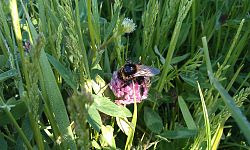

This week (8-14 July) is Bees' Needs Week, which is an annual event co-ordinated by the Department for Environment, Food and Rural Affairs (DEFRA), working alongside a host of organisations such as conservation groups, businesses and charities.
The aim of the week is to raise awareness of the importance of pollinators, and share ideas, actions and activities that highlight the ways in which everyone can help bees and other pollinators to thrive.
Protect pollinators!
Pollinators are a priority for the UK government and a key part of delivering the Environmental Improvement Plan. We know that bees, and other pollinating insects, are an essential part of our environment and play a crucial role in food production.
DEFRA works in partnership with many organisations and partners to help our precious pollinators survive and thrive. They emphasise the important role everyone has to play to encourage butterflies and bees in your local area.
We can all take simple steps to protect our pollinators and help to restore our natural world!
National pollinator strategy
The National Pollinator Strategy is a ten year plan which was published in 2014 and developed after a thorough review of the evidence base and wide consultation.
It sets out how government, beekeepers, conservation groups, farmers, researchers, industry and the public can work together to improve the status of pollinating insect species in England.
The National Pollinator Strategy Action Plan, which was published under the 2019-2022 Johnson Conservative government, sets out more specifically how we will act to fulfil the vision, aims and objectives of the Strategy.
Through the Species Survival Fund, DEFRA are creating and restoring nature-rich landscapes full of wildlife-friendly habitats that will help our bees and pollinator populations to prosper. DEFRA are also funding Local Nature Recovery Strategies to develop opportunities to restore and create habitats locally, benefiting a range of species, including pollinators.
Through their Environmental Land Management schemes, farmers and land managers will play an essential role in halting the decline in species, including insects, by 2030. The schemes offer a choice of support for more regenerative approaches to farming, and creation or restoration of habitats in appropriate areas.
What can I do?
There are five simple actions that anyone can take to help pollinators:
This year you can also get involved with Flower-Insect Time (FIT) Counts and invaluable citizen science. All you need to do is simply spend ten minutes watching flowers and insects in good weather.
These can be done anywhere, including gardens and parks in warm, dry weather, any time from April to September. Each count can be submitted to the UK Pollinator Monitoring Scheme (PoMS) which helps them to make data more meaningful, and to help them learn more about where pollinators live and how their numbers are changing.